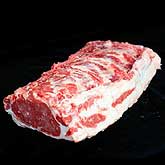Food Irradiation: A Safe Measure
 Food safety is a subject of growing importance to consumers. One reason is the emergence of new types of harmful bacteria or evolving forms of older ones that can cause serious illness. A relatively new strain of E. coli, for example, has caused severe, and in some cases life-threatening, outbreaks of food-borne illness through contaminated products such as ground beef and unpasteurized fruit juices. Scientists, regulators and lawmakers, working to determine how best to combat food-borne illness, are encouraging the use of technologies that can enhance the safety of the nation's food supply. Many health experts agree that using a process called irradiation can be an effective way to help reduce food-borne hazards and ensure that harmful organisms are not in the foods we buy. During irradiation, foods are exposed briefly to a radiant energy source such as gamma rays or electron beams within a shielded facility.
Food safety is a subject of growing importance to consumers. One reason is the emergence of new types of harmful bacteria or evolving forms of older ones that can cause serious illness. A relatively new strain of E. coli, for example, has caused severe, and in some cases life-threatening, outbreaks of food-borne illness through contaminated products such as ground beef and unpasteurized fruit juices. Scientists, regulators and lawmakers, working to determine how best to combat food-borne illness, are encouraging the use of technologies that can enhance the safety of the nation's food supply. Many health experts agree that using a process called irradiation can be an effective way to help reduce food-borne hazards and ensure that harmful organisms are not in the foods we buy. During irradiation, foods are exposed briefly to a radiant energy source such as gamma rays or electron beams within a shielded facility.
Irradiation is not a substitute for proper food manufacturing and handling procedures. But the process, especially when used to treat meat and poultry products, can kill harmful bacteria, greatly reducing potential hazards. The Food and Drug Administration has approved irradiation of meat and poultry and allows its use for a variety of other foods, including fresh fruits and vegetables, and spices. The agency determined that the process is safe and effective in decreasing or eliminating harmful bacteria. Irradiation also reduces spoilage bacteria, insects and parasites, and in certain fruits and vegetables it inhibits sprouting and delays ripening. For example, irradiated strawberries stay unspoiled up to three weeks, versus three to five days for untreated berries. Food irradiation is allowed in nearly 40 countries and is endorsed by the World Health Organization, the American Medical Association and many other organizations.
Irradiation does not make foods radioactive, just as an airport luggage scanner does not make luggage radioactive. Nor does it cause harmful chemical changes. The process may cause a small loss of nutrients but no more so than with other processing methods such as cooking, canning, or heat pasteurization. Federal rules require irradiated foods to be labeled as such to distinguish them from non-irradiated foods.
Fact Credit
U.S. FDA


